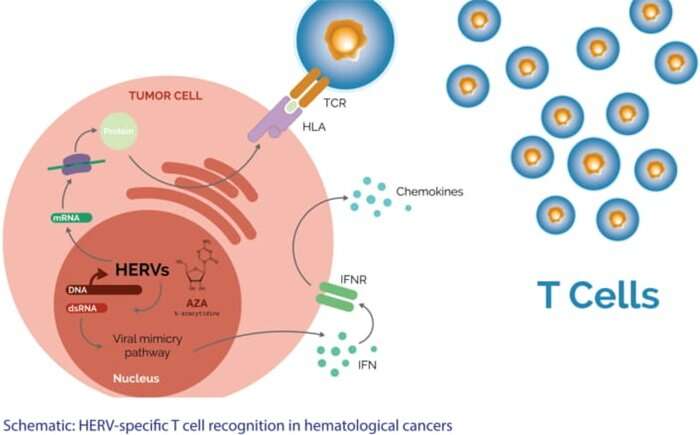A step forward toward immunotherapy for hematological cancers

In cancer treatment, immunotherapy helps the patient's immune system fight cancer, for example through better recognition of the cancer cells, and it has proven effective in various types of cancer.
T-cells play a central role in eliminating tumors and are the major target for cancer immunotherapies. Hematological cancers, however, present with a limited number of cancer-specific T-cells compared to solid tumors, which is why immunotherapy has not previously been efficient against hematological cancers.
An additional reservoir of cancer-specific T-cells
A research team headed by Professor Sine Reker Hadrup, DTU Health Tech, now show that T-cell antigens derived from human endogenous retroviruses (HERVs) in patients with hematological malignancies can be used as an alternative source of cancer-specific antigens potentially targeted for cancer immunotherapies.
"Our study show large-scale activation of HERVs in hematological cancers and the T-cells of the immune system specifically recognize antigens derived from such HERVs. We believe that our finding of HERV-specific T-cells may have substantial therapeutic implication, as this provides an additional reservoir of cancer-specific T cells that can be targeted by ongoing immunotherapy approaches", Assistant Professor Sunil Kumar Saini says.
Professor Sine Reker concludes: "We need to examine HERV-derived T cell recognition in more detail in immunotherapy treatment combinations to determine the direct impact of T-cell recognition of HERV-derived antigens on tumor regression. But with these results, we are a step further towards developing new immunotherapy approaches."
More information: Sunil Kumar Saini et al. Human endogenous retroviruses form a reservoir of T cell targets in hematological cancers, Nature Communications (2020). DOI: 10.1038/s41467-020-19464-8


















